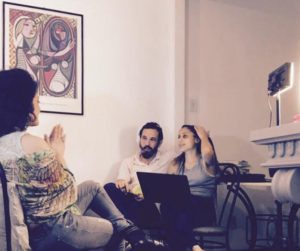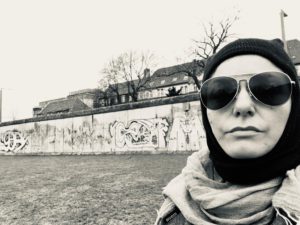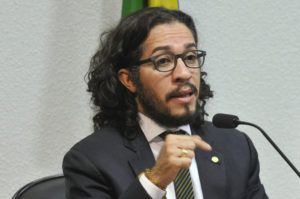December 8th, 2018. João Teixeira de Farias, commonly known as “João de Deus” (“John of God” in Portuguese), the worldwide famous spiritual leader is on the news this time not because of his acclaimed “healing powers”, but surprisingly due to one of the biggest sexual scandals in the world, being accused of sexually abusing more than 500 women.

João de Deus became internationally renowned for his “spiritual surgery” and treated international celebrities and political leaders, receiving thousands of visitors in his “clinic”, among which many foreigners. He is now all over the news for a massive scandal, first disclosed by Brazil´s biggest TV channel. Right after the scoop, the Public Ministry along with the Civil Police stated that the Brazilian government had already been conducting an investigation concerning João de Deus for several months and that there were claims of sexual harassment being reported since 2010. A special task force was also organized to receive testimonials from victims and João de Deus has now been arrested and is being prosecuted for sexual abuse, fraud, illegal possession of firearms and human trafficking.
Away from the spotlight of the media, one female character has played an important role in bringing this and other similar stories to light: Sabrina Bittencourt. A Brazilian activist and social entrepreneur for more than 20 years, she has been dedicating her personal and professional life to social issues, mainly related to gender, by advocating for women’s rights in the country and abroad. As a consequence, Sabrina has suffered life threats and ended up with no other option but to leave her country. In her exile, Sabrina connected with other women and expanded her international network through the internet, strengthening her connections with female activists in Brazil and abroad.
In 2016, a case of collective rape shocked the country and led Sabrina into a new experience of cyberactivism. A 16-year old girl was raped by a group of 33 men in Rio de Janeiro, which sparked strong reactions in Brazilian society, showing that violence against women is still a controversial issue in the country. While women organized protests and strengthened their activism, many comments on social media were blaming the victim for the crime, pointing at her behaviour, lifestyle and clothes as probable “causes” to what had been done to her. Reacting to these opinions Sabrina decided to tell her own story of sexual abuse using the hashtag #eusousobrevivente (I am a survivor). Her goal was to encourage other women to come forward and tell their stories of abuse to help reverse this tendency of victim blaming and shaming. In her post, that was shared more than 50.000 times in three days, she also highlighted how black women receive worse treatment from authorities when they come forward. Since then, Sabrina received daily reports from women worldwide that had been victims of sexual abuse through social media.

As observed by Manuel Castells (2015), cyber activists build strong networks with different groups in society through the free public space of the Internet, creating a space to share their stories and challenge the status quo:
By sharing sorrow and hope in the free public space of the internet, by connecting to each other, and by envisioning projects from multiple sources of being, individuals formed networks, regardless of their personal views or organisation attachments. They came together, and their togetherness helped them to overcome their fear, this paralyzing emotion on which the powers that be rely in order to prosper and reproduce, by intimidation or discouragement, and when necessary by sheer violence, be it naked or institutionally reinforced. (Castells, Networks of Outrage and Hope, p.2)
Thus, Sabrina and her hashtag have been important in helping women from different places in a huge country like Brazil to overcome their fears of speaking openly about their cases of abuse. In a country where victim shaming is common, giving visibility to a huge number of abuse stories and creating a sense of togetherness (under a common tag, as was also done by the #metoo movement), can encourage women to speak up and have an important role in changing people’s perceptions about violence against women.

Sabrina became such a central figure during the collective-rape case in 2016 that when in August 2018 a story involving a spiritual leader, Sri Prem Baba, broke the news, Sabrina was approached by several women that declared being abused by him. Working on the Prem Baba case, she then started receiving messages regarding another famous leader, João de Deus.
In this short period, Sabrina has built a complex network of alliances that allowed her to take these two cases forward, leading to the arrest of these powerful male figures while protecting the victims. She learned how to work with the media and became a source for independent journalists and activists, while also strengthening ties with local NGOs fighting women abuse. She founded Combate ao Abuso no Meio Espiritual (Coame), an organisation that fights against sexual crimes performed by spiritual leaders and received awards for her accomplishments, increasing visibility of cyberactivists and women’s rights.
In an interview for the Brazilian magazine Carta Capital, Sabrina explained how she worked in these cases:
Sabrina’s explanation brings important insights on how building trustful networks can be used to help fight violence against women in cases where powerful leaders are involved. But as we can already notice from her comment, her actions go beyond sustaining a trustful online network: she also connects her cyberactivism to authorities “on the ground” and learned how to navigate the legal system, becoming a source and working closely with the Public Ministry.

In fact, reporting this kind of crime to authorities seems to be the main challenge in the Brazilian criminal system, be it in cases involving prominent leaders or not, as the numbers show that violence against women goes under-reported in the country. In fact, in 2017 Brazil had an average of 164 cases of rape reported per day, that is, more than 60,000 rapes in the year. This number, however, reflects only 7% to 10% of the total cases of rape that happened, meaning that there could be around half a million cases of rape in Brazil per year. Beyond the spotlight of news scoops and special police operations, most of the victims of rape in Brazil are children and teenagers and most of rapists are men that are closely connected to the victims, which is probably why so many cases are never brought to light.
Activists have thus approached the issue of women violence from different angles. For instance, Mapa do Acolhimento, works as a platform to connect victims of sexual abuse to therapy and legal services, since the state has not been able to provide the safe conditions for this to happen systematically. At the same time, Sabrina’s work in these “big cases” and the hashtag “Eu sou sobrevivente” have helped increase visibility for the cause and show how under-reported these crimes are. But her work in connecting victims, the media and the judiciary system also shows that online networks can be even stronger and more efficient when well aligned with actors on the ground.
On the other hand, increasing visibility and strengthening networks for activists is becoming even more important now that Brazil’s recently elected extreme right-wing president has made several statements against women and minorities. Like Sabrina, other activists have left the country due to death threats: the activist Debora Diniz, due to her fight to legalize abortion in Brazil and Jean Wyllys,

an LGBT advocate and openly gay congressman, has decided not to start his third term and leave the country. The general feeling of lack of safety does not go unfounded: last year, the Human Rights advocate and council member Marielle Franco was shot and killed while returning from an event focused on empowering young black women.
Piece by Alice Kasznar, Maiara de Paula and Luiza Paiva
By the time we finished writing this article, we received the news that Sabrina Bittencourt had committed suicide. One of the last places she visited was Barcelona with the mission to build a network to protect to Brazilian people in exile. She left a letter mentioning her history of being sexually abused, commenting on the current state of women’s rights in Bolsonaro’s government, while also reinforcing Marielle’s importance and how they would meet again now. More information on that is still being released by the press.
